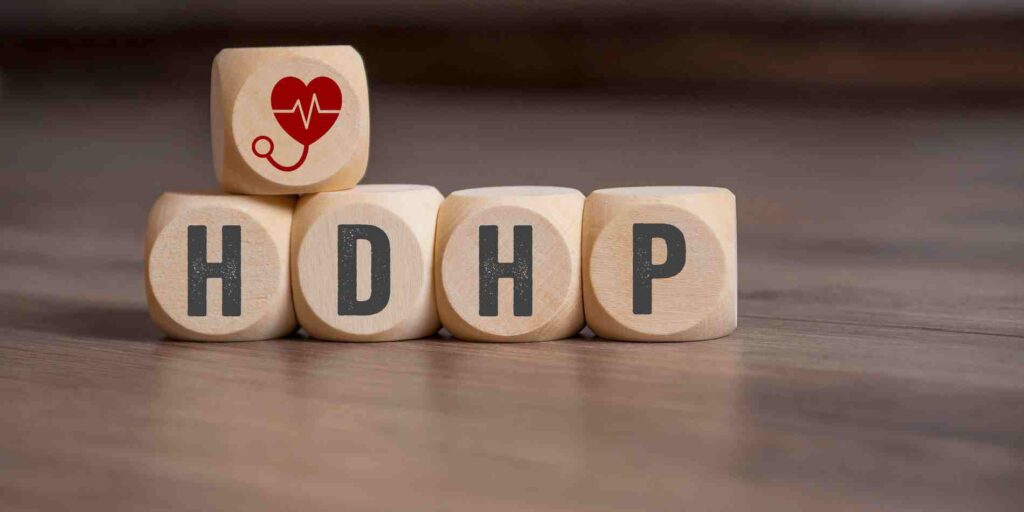Choosing the right health insurance plan can be tough, especially when you’re trying to balance monthly costs with the potential for big medical bills. High-deductible health plans, or HDHPs, have become more popular because they often come with lower premiums. However, they also come with risks that can catch you by surprise if you’re not prepared. In this article, we’ll explore how risky a high-deductible health plan can be, what you need to know before choosing one, and how to protect yourself from unexpected costs.
What is High-Deductible Health Plan (HDHP)?

A High-Deductible Health Plan (HDHP) is a type of health insurance plan that, as the name suggests, has a higher deductible than typical health insurance plans. The deductible is the amount you pay out-of-pocket for healthcare services before your insurance plan begins to pay.
The Internal Revenue Service (IRS) defines an HDHP as any plan with a deductible of at least $1,600 for an individual or $3,200 for a family in 2024. This means that you would need to pay at least these amounts out-of-pocket in a year before your health insurance starts covering your healthcare costs.
The main advantage of an HDHP is that it has lower monthly premiums compared to other health insurance plans. This can make it an attractive option for people who are generally healthy and do not require frequent medical care. However, if you do require significant medical care, the high deductible can mean that you end up paying more out-of-pocket before your insurance coverage kicks in.
It’s important to note that most HDHPs allow participants to open a Health Savings Account (HSA), which can be used to pay for qualified medical expenses tax-free. This can help offset the costs of the high deductible.
Remember, choosing a health insurance plan is a significant decision that should be based on your individual health needs and financial situation.
Pros and Cons of HDHP
A high deductible health plan (HDHP) is a type of health insurance that has a lower monthly premium but a higher deductible, which is the amount you pay out of pocket before your insurance covers any costs. HDHPs have some pros and cons that you should consider before choosing one. Here are some of them:
Pros of HDHP
- You pay less for your monthly premium, which can save you money in the long run if you are healthy and do not need much medical care.
- You can open a health savings account (HSA) if you have an eligible HDHP, which allows you to save money for healthcare expenses in a tax-advantaged way. You can also invest your HSA funds and grow them over time.
- You get full coverage for preventive care, such as annual checkups, screenings, and immunizations, even before you meet your deductible. This can help you stay healthy and avoid costly health problems in the future.
- You have more control and flexibility over your healthcare spending, as you can shop around for the best prices and quality of services.
Cons of HDHP
- You have to pay a high deductible before your insurance covers any costs, which can be a financial burden if you have unexpected or chronic medical needs. You may also have to pay more for coinsurance and copays after you meet your deductible.
- You may be tempted to skip or delay necessary medical care because of the high out-of-pocket costs, which can worsen your health condition and lead to higher expenses later.
- You may not have access to some benefits or services that are covered by other types of plans, such as vision, dental, or prescription drug coverage. You may have to pay extra for these or buy separate plans.
- You may have to deal with more paperwork and hassle, as you have to keep track of your medical bills, receipts, and HSA transactions. You may also have to negotiate with providers or insurers about the prices and coverage of your services.
Remember, the suitability of an HDHP depends on your individual health needs and financial situation.
Who Should Consider an HDHP?
High-Deductible Health Plans (HDHPs) can be a good choice for certain individuals, but it’s important to consider your personal health needs and financial situation. Here are some groups who might benefit from an HDHP:
- Healthy Individuals: People who are generally healthy and don’t often visit the doctor might find an HDHP to be a cost-effective option. Since they don’t expect to incur high medical costs, they can benefit from the lower premiums of an HDHP.
- High-Income Earners: Those with a higher income may be able to afford the high deductible in case of a sudden health issue. They can also take advantage of the tax benefits associated with Health Savings Accounts (HSAs), which are often paired with HDHPs.
- People with Chronic Conditions: It might seem counterintuitive, but some people with chronic conditions might benefit from an HDHP. This is because many HDHPs cover preventive care (like check-ups and certain treatments) before the deductible is met.
- Savers: If you’re good at saving money, an HDHP might be a good fit. The money you save on premiums can be put into an HSA, where it grows tax-free and can be used to pay for qualified medical expenses.
- Those Planning for Retirement: HDHPs can be a good option for those planning for retirement. The funds in an HSA can be used for qualified medical expenses in retirement, and after age 65, can be withdrawn for any purpose without penalty (though income tax may apply).
How Does Health Insurance Work When A Baby is Born?
Remember, everyone’s health and financial situation is unique, so it’s important to carefully consider your own needs and consult with a healthcare professional or financial advisor before making a decision.
How to Decide if an HDHP is Right for You?

Deciding if a High-Deductible Health Plan (HDHP) is right for you involves careful consideration of your health needs, financial situation, and risk tolerance. Here are some steps to help guide your decision:
- Assess Your Health Status: Consider your current health condition and medical needs. If you’re generally healthy and rarely visit the doctor, an HDHP might be a good fit. However, if you have a chronic condition or anticipate needing frequent medical care, the high deductible could lead to significant out-of-pocket costs.
- Evaluate Your Financial Situation: Can you afford the high deductible in case of a sudden health issue? Do you have savings to cover medical costs until you reach your deductible? Remember, with an HDHP, you’ll pay less in premiums but more when you need care.
- Consider Your Risk Tolerance: Are you comfortable taking on the risk that comes with a high deductible? Some people are more risk-averse than others. If the thought of potentially high medical costs makes you uneasy, an HDHP might not be the best choice.
- Think About Your Future Needs: Are you planning for a family? Do you have upcoming surgeries or procedures? If your healthcare needs are likely to increase in the near future, an HDHP might not be the most cost-effective option.
- Consult a Professional: Speak with a healthcare professional or financial advisor. They can provide personalized advice based on your specific circumstances.
Remember, choosing a health plan is a personal decision that should be based on your individual health and financial circumstances.
How Risky is A High-deductible Health Plan?
A high-deductible health plan (HDHP) is a type of health insurance that has a lower monthly premium but a higher deductible, which is the amount you pay out of pocket before your insurance covers any costs. HDHPs have some risks that you should be aware of before choosing one. Here are some of them:
- Large medical expenses: Since HDHPs generally only cover preventive care, an accident or emergency could result in very high out-of-pocket costs. You may have to pay thousands of dollars before your insurance starts to pay anything.
- Future health risks: Because of the costs, you may refrain from visiting a physician, getting treatments, or purchasing prescriptions when they are not covered by your HDHP. This could worsen your health condition and lead to higher expenses later.
- High deductibles: Many Americans have a relatively low amount of money in savings. If you have a tight budget or limited savings, an HDHP may put you at financial risk if you face a large medical bill. You may not be able to afford to pay your deductible upfront or within a short time frame.
- Limited benefits or services: You may not have access to some benefits or services that are covered by other types of plans, such as vision, dental, or prescription drug coverage. You may have to pay extra for these or buy separate plans.
Does Homeowners Insurance Cover the Death of Owner
HDHPs are not for everyone. They may work well for people who are healthy, have enough savings, and want to save money on monthly premiums and taxes.
How do I Know If I Have A High Deductible Health Plan
To determine if you have a High Deductible Health Plan (HDHP), you can follow these steps:
- Check Your Plan Documents: Look at your health insurance policy documents or your insurance card. HDHPs often have “HDHP” or “HSA” in the plan name.
- Review the Deductible Amount: For 2025, an HDHP must have a minimum deductible of $1,650 for individual coverage and $3,300 for family coverage. If your deductible meets or exceeds these amounts, you likely have an HDHP.
- Look at Out-of-Pocket Maximums: HDHPs have specific out-of-pocket maximum limits. For 2025, these limits are $8,300 for individual coverage and $16,600 for family coverage.
- Contact Your Insurance Provider: If you’re still unsure, call your insurance company. They can confirm whether your plan qualifies as an HDHP.
- Employer Resources: If you have insurance through your employer, check with your Human Resources or Benefits department. They can provide detailed information about your plan.
HDHPs are often paired with Health Savings Accounts (HSAs), which offer tax advantages for medical expenses. If you have an HSA, it’s another indicator that you might have an HDHP.
FAQs
Q 1. What is a Health Savings Account (HSA) and how does it work with an HDHP?
Ans. An HSA is a tax-advantaged account that you can contribute to if you have an HDHP. The money you put into the account can be used tax-free for eligible medical expenses. This includes deductibles, copayments, coinsurance, and other qualified expenses. The funds in an HSA roll over from year to year and can even be invested, providing a way to save for future medical costs.
Q 2. Can I switch from a traditional health plan to an HDHP during open enrollment?
Ans. Yes, you can typically switch to an HDHP during your employer’s open enrollment period. However, it’s important to carefully compare the costs and benefits of an HDHP with your current plan before making a decision.
Q 3. What happens to my HDHP if I change jobs?
Ans. If you change jobs, you may lose coverage under your current HDHP. However, any money in your HSA remains yours and can still be used for eligible medical expenses. If your new employer offers an HDHP, you can continue making contributions to your HSA.
Q 4. Can I have other forms of health coverage with an HDHP?
Ans. Having certain types of additional health coverage can make you ineligible to contribute to an HSA. However, you can have certain types of insurance such as dental, vision, disability, and long-term care insurance without affecting your HSA eligibility.
Q 5. Can I contribute to an HSA if my spouse has a non-HDHP?
Ans. If your spouse has a non-HDHP but you have an HDHP, you can still contribute to an HSA. However, if your spouse’s plan provides benefits to you before you meet your HDHP deductible, you may be ineligible to contribute to an HSA.
Q 6. What happens to my HSA when I retire?
Ans. After age 65, you can still use your HSA funds tax-free for eligible medical expenses. If you use the funds for non-medical expenses, they will be taxed as income but you won’t face any penalties.
Conclusion
In conclusion, a High-Deductible Health Plan (HDHP) can be a viable option for some, offering lower premiums and potential tax advantages. However, it’s not without its risks. The high deductible can lead to significant out-of-pocket costs, especially for those with chronic conditions or unexpected health issues. Therefore, it’s crucial to assess your health status, financial situation, and risk tolerance before deciding if an HDHP is right for you.
Remember, healthcare decisions are deeply personal and what works for one person may not work for another. Always consult with a healthcare professional or financial advisor to make an informed decision. As the landscape of healthcare continues to evolve, staying informed and understanding your options is the best way to ensure you’re making the best choice for your health and financial well-being.

Join Shubham, a finance enthusiast with a mission to empower readers with the knowledge and tools to achieve financial freedom. Discover smart financial advice and unlock your financial potential.


